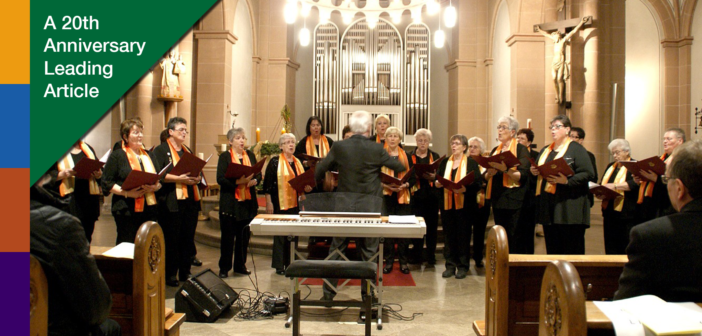Brian Hehn says a church can have a vital music ministry if its choir focuses on four key functions — leading and enlivening congregational singing, singing music that the congregation cannot, serving as a small group within the church for faith formation, and singing music that glorifies God and edifies the congregation.
To celebrate the Lewis Center’s anniversary, we are highlighting Leading Articles — some of our most popular posts of the past 20 years. We are pleased to share again this article by Brian Hehn, originally published on February 1, 2017.
As the director of a church choir, I use four functions to explain why the church choir exists and to help determine the programmatic choices that our music ministry makes. These functions are in a specific priority order, but I also believe each function is equally important as they must be present to have a vital music ministry.
1. The church choir leads and enlivens the congregation’s song.
Let’s not forget that without a congregation, there could not be a church choir! The singing group would instead be a community choir. But why is it important that the congregation’s song be supported, instead of just focusing on the church choir’s musical success? Choral musicians know that we become what we sing. When we take words and put them to music, it becomes part of who we are. Therefore, it becomes imperative that we put as much of the Word into the congregation as possible. If the congregation can sing it, but we don’t let them, we miss an opportunity to transform people’s lives in the most direct way possible. By giving the congregation new singing skills and confidence, we empower them for the rest of their lives to better embody God’s Word through music.
Taking our cue from the great church musician John Ferguson, it is important to view the congregation as the “big choir,” and the church choir as the “little choir,” or as I like to think of it, my chamber group. I often utilize my choir as “section leaders,” positioning them around the congregation strategically to support the parts that I’m teaching for a congregational hymn or song. I have the choir stand in front of the congregation to lead them in rounds and canons. They become active leaders in building up the congregation’s song. By doing this, the congregation is prepared for discipleship through the soul-embracing power of song.
2. The church choir sings music that the congregation cannot.
Let’s be real. There’s lots of great music that needs to be sung that just cannot reasonably be done by a congregation because it’s too complex to be done by untrained musicians or just too difficult to be done without extensive rehearsal. There are some texts set to challenging music that congregations need to hear, whether it’s because it is comforting in times of crises, praising in times of joy, or inspiring in times of apathy. By spending the time and effort to rehearse each week, the choir provides a great service to the congregation by opening up the amount of literature the congregation can be exposed to. Used appropriately, this has significant theological and musical implications, broadening the congregation’s experience of the divine.
3. The church choir serves as a small group within the church for faith formation.
I imagine that we all have stories about our choral groups taking care of each other or holding someone up in a time of need. When we sing together, a bond is created that unites us unlike any other activity. In a church setting, this function can be intentionally formed and nurtured. Because we meet together once a week to do work for the Glory of God and benefit of neighbor, taking care of each other is no longer an option; it’s a responsibility.
As the leader of this small group, a church choir director’s job is no longer limited to musical direction, but also spiritual direction. This doesn’t mean you’re responsible for giving a sermon each week or listening to people’s confessions, but it does mean that you are charged with ensuring your group enacts the Word you sing week in and week out. I expect them to act like “Christ’s love has gathered us into one,” and my expectations are almost always met because the majority of my singers have been singing their faith for decades and have already been formed by the church’s song. I rarely have to ask for food to be brought or people to be prayed for because before I can bring it up, someone from the group has already asked for it to be done by their fellow choir members. It’s a witness that is refreshing to see each and every year I direct.
4. The church choir sings beautiful and challenging music to praise God and edify the congregation.
This is where the majority of our rehearsal time is taken up, because singing challenging music beautifully is difficult to do and takes lots of practice. It is important that when we sing, we sing beautifully, because it touches people’s souls. The reason that we work so hard to create beautiful music together is so that we can glorify God and help people experience a holy moment. On the opposite end of the spectrum, it is important that our singing is not outrageously bad because it can be distracting and therefore prevent people from having a holy moment. I find that one of the best motivations for my choir when rehearsal is getting into the nitty-gritty, is to say something like, “This is a moment where we can touch someone and help them have a moment with God.” Reminding the choir that musical details can make the difference in someone’s spiritual life goes a long way to power through tough rehearsal moments.
It is important, however, that the first three priorities are not forgotten when trying to achieve our most beautiful sounds. A church choir’s job is not just to sing beautifully, but rather it is to minister to the congregation and to each other in a variety of ways, helping to change the world into a more loving and peaceful place.
Letting these four functions guide your program makes the choir a conduit of faith for themselves and the congregation. Telling your choristers what and why they do what they do gives them a framework to express the importance of the church choir and be an advocate for music ministry. Most importantly, these four functions can enliven your congregation’s singing through the faithful discipleship of your church choir members.
Related Resources
- Music — the Bellwether of Church Health by Michael White and Tom Corcoran
- A Choir Director Shares Recruiting Tips that Any Ministry Group Can Use by Scott Glysson
- Forging More Collaborative Relationships between Clergy and Musicians by Eileen Guenther






